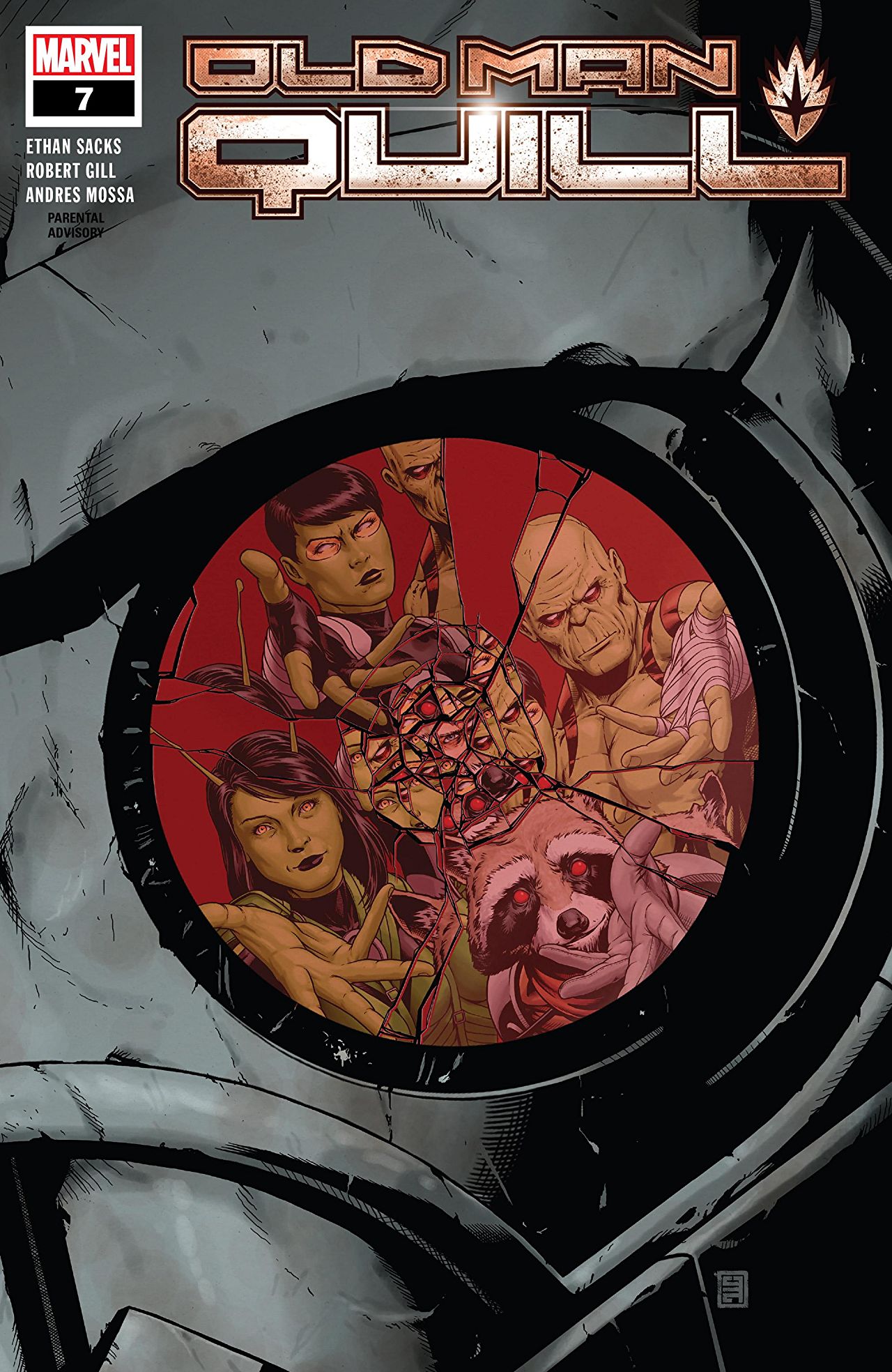Pick of the Week Podcast
Show Notes
This week we will absolutely not go long… is what we tell ourselves, so Josh Flanagan, returned, takes it off the rails immediately. No, not by the talk. It’s good comic talk. What else would you expect. But maybe he’s just so excited about his co-jamoke, he can’t help it. Anyway, we’ve got comics and opinions about those comics. Some are starting, and some are ending, and we hope you enjoy it.
Running Time: 01:20:01
Pick of the Week:
00:02:20 – Old Man Quill #7
 Comics:
Comics:
00:09:53 – Lois Lane #1
00:15:38 – No One Left to Fight #1
00:21:26 – Sea of Stars #1
00:26:26 – Captain America and The Invaders: The Bermuda Triangle #1
00:32:06 – Superman: Up in the Sky #1
00:36:19 – The Wild Storm #24
00:38:46 – Postal: Deliverance #1
00:40:44 – Crowded #7
Patron Pick:
00:42:18 – The Walking Dead #193
Patron Thanks:
00:57:35 – Caleb Peters
00:58:54 – Enda O’Driscoll
01:00:10 – Viren Patel
01:01:34 – Jason Smith
Audience Question:
01:03:30 – Scott asks our opinion on comics media, and off we go!
Brought To You By:
 • Mack Weldon – Mack Weldon makes fantastic premium men’s underwear and essentials. Go to MackWeldon.com and get 20% off your first order using promo code IFANBOY
• Mack Weldon – Mack Weldon makes fantastic premium men’s underwear and essentials. Go to MackWeldon.com and get 20% off your first order using promo code IFANBOY
• iFanboy Patrons – Become one today for as little as $3/month! Or make a one time donation of any amount!
• iFanboy T-Shirts and Merch – Show your iFanboy pride with a t-shirt or other great merchandise on Threadless! We’ve got seven designs!
Music:
“Tired of Being Alone”
Al Green
Subscribe
Get Involved
Doing the podcast is fun and all, but let's be honest, listening to the 2 of us talk to each other can get repetitive, so we look to you, the iFanboy listeners to participate in the podcast! "How can I get in on the fun?" you may ask yourself, well here's how:
- E-Mail us at contact@ifanboy.com with any questions, comments or anything that may be on your mind.
Please don't forget to leave your name and where you're writing from and each week, we'll pick the best e-mails to include on the podcast!


Thanks for the pointy power Conor. (Does it work if I point to myself?) And thank you ifanboy for being that lovely part of a Sunday night before the shit starts all over again in Monday.
“Qwickster” gentlemen.
The genius Netflix spin-off company name that the world still mourns that never came to be.
Also I agree with Conor’s assessment in general of “Comics Media” and its lack, however, I would say that its actually a much larger issue, where few in comics even themselves seriously consider comics an art form(beyond self congratulating lip service to justify their career choice to ignorant public), so what is there in comics to seriously probe?
How many decades are we into this art form and we have yet to even have a basic text or website that identifies or catalogs any of the techniques used in the medium itself, their inventors, innovators and timelines. When was the first use of inset panels, splash pages, diagonal compositions…etc. All analysis in comics is fan analysis. All comics history books are about the behind the scenes gossip and relationships not about the advancements on the page. (Flip through any art history text to see the difference)
All the more serious arts criticism places contemporary work in its art historical context (what new ground are they breaking/ perceived boundaries are they pushing) and compares it with its place in our current culture. (how is the artist influenced by it or commenting on it)
Its impossible to write any criticism like that in comics because first you’d have to undertake the gigantic task of writing the entire history of the comics medium as an art form.
and now I’m done ranting…and I’m late…damn podcasts.
oops, retroactive humility:
I don’t mind pleading ignorant here. If there really is a text out there that systematically categorizes the methods of comics art form and their relevance I would love to know. I am by no means near an expert, which is why I don’t just go write one.
dang a freakin roo now i’m really late.
Scott McCloud’s Understanding Comics and its predecessors are a pretty good start.
Thanks Josh. For anyone who hasn’t read it before Scott Mclouds books are excellent.
However I must be a poor communicator, as my copy is a decade old, worn out and I tell you you as much as I appreciate it, Understanding Comics is still written from a “fan” perspective rather than an academic one. (ie : I made comics and so can you, here’s how)
Also check out Will Eisner’s books on sequential storytelling too. Which are also essentially “here’s how to make comics like me and what I’ve learned “ books.
Comics need a scholarly compendium so that all discussion can springboard from those agreed upon standards. Anyone entering film or visual arts (or music, opera, theater…) has a set of agreed upon terms, techniques and historical context to form opinions with.
Comics do not even have agreed upon terms for the techniques employed in the medium. Rather it’s just a hodgepodge of terminology from other art forms criticism at best. See terminology from film criticism (pan, fade in, cut, etc.) or from visual arts (form/background, composition, layout, light source, etc.) and that doesn’t cover anything unique to comics.
No other art form is about substituting space for time or attempting to control the pace in which the reader advances through the work. Comics needs formal terms and historical context for its unique techniques that it employs.
I mean can you, or anyone, tell me who was the first cartoonist to use any given page layout, panel type, inking style, coloring technique? What were the predecessors and current outside cultural influences that spawned those techniques?
I don’t know. To me comics will not be considered a unique art form without those things. And no collection of random fans “here’s my opinion on comics” will ever help.
As embarrassing as it is to keep posting large comments of text, two final points:
You guys had a liberal arts education, remember back to film appreciation or art history survey course. Look back at the texts used in those classes (Film Art, an introduction or Gardner’s Art History or whatever is being used nowadays) and compare those to “Understanding Comics” and tell me they’re the same. Of course they aren’t. No comparison. and Mcloud wasn’t even trying to be like them. And that’s my point. By fans, for fans.
Then think about why film makers like Orson Welles or Hitchcock and /or artists like Picasso or Cezanne (to name old agreed upon folks) are considered important. You instantly think about their innovations compared to their contemporaries and then place them in a line with past artists. We don’t have ten different names to explain the fracturing of the picture plane in cubism or the camera angles and cutting in film. And people just coming to these art forms have scholarly texts to refer.
OK. Dones for reals now. No one has solved comics yet and it sure as heck ain’t going to be me.
Ah! But there is a comics academia that is doing this kind of work.
Great recent texts to start with are:
Breaking the Frames by Marc Singer (addresses a lot of the “seminal” work that comics scholars use)
Reading Nancy by Paul Karasik and Mark Newgarden
Unflattening by Nick Sousanis
The Comics Journal
most of Hilary Chute’s work
The Middle Spaces (website) by Osvaldo Oyola
If you’re into really detailed brainy stuff, Neil Cohn is awesome. Most of my recommendations are more about structure/format, but there is a bunch of great stuff out there about the history of comics from different povs and fields as well.
While most comics scholars find their homes in adjacent fields (history, american studies, literature, sociology, linguistics), there are thriving comics studies departments in Michigan, Texas, Florida, and Dundee! Of course, there are some issues with the field, but they are the same issues that most developing fields are facing (Marc Singer talks about a lot of them in his book).
The fun thing about academic fields, is that they’re not really something that you need to solve. It’s an ongoing conversation among scholars, readers, and (yes) fans. As long as the level of thought pushes the conversation forward, all are welcome to add.
(end of rant)
ps. a bit of a self plug, but for non-academic stuff, PanelxPanel is a great place to look for in depth and thoughtful comics journalism.
…if I weren’t born broken hearted, a tear would form in my eye, over how well the internet has worked out here.
I was hoping for exactly this reply.
Thanks much for the suggestions. (And as a sign of how grateful I am I won’t even quibble about the one’s I’m familiar with)
Also to avoid your necessity for any self promotion I’ll commend the work at PanelxPanel and also tell ever ifanboyer to immediately stop reading my ramblings and you-tube the PanelxPanel adjacent videos at Strip Panel Naked & just watch all of them on endless repeat.
If you find everything I’ve written here annoying, you’ll love Strip Panel Naked. Approachable, thoughtful analysis about why the comics you actually read are so great.
and its Thursday night on last weeks show comments, so that’s more like a shout into the abyss than a plug. But I try.
Walking Dead and BPRD both finished up at relatively the same time, which for me is interesting since those have been my anchors forever as far as comic buying. Also Wild Storm finished up and I was collecting that. Admittedly that is a much shorter run, but I was enjoying that and I’m not sure I’ll stick around if the follow-on books are gonna be a different creative team. I really enjoyed having a couple books each month that were long running books with creative team continuity. I’m gonna miss that.
I suddenly find myself potentially buying way less comics per month. I guess I have to find something new books.
Also I’m real happy you guys decided to do the rest of Planetary. That should be an interesting conversation if Josh never finished it previously. That fact that the series finished at all seems like a small miracle and for some reason Warren doesn’t like to talk about Planetary anymore which is too bad. I think it’s one of his more entertaining books.